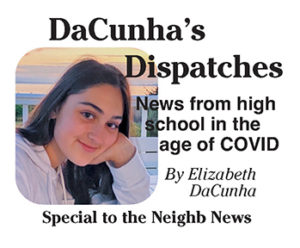 FAIRHAVEN HIGH SCHOOL: 12/3/20
FAIRHAVEN HIGH SCHOOL: 12/3/20
The year 2020 has been anything but normal: Masks, lockdowns, social distancing.
You hear it all from adults complaining about losing money and working from home, but does anybody talk about the effects Covid is having on children these days? If you haven’t heard much about it yet, prepare to get a look on the inside, COVID through the eyes of a kid.
First, let’s take a look at how life was for kids back in March when the world first shut down.
Initially, everyone was excited to miss a couple days of school, sleeping in late, having no work. Then, a couple of days turned into a couple of weeks, then a couple of months. Before you knew it, the rest of the school year was canceled, and no one was to leave their homes.
When work was given, it was optional and simply a review of topics learned prior to the lockdown. Students carelessly completed it, and when asked, felt it was boring, useless, busy-work.
End of the year activities like graduation were canceled, taking away the experience and memories as well. Instead, kids felt like those next few months were a waste of time. Even summer was hard for lots of students because parents had them stay home, not being able to see friends. Luckily, there were also many students that were able to go out and safely hang out with their friends, finally having some sort of social interaction since the lockdown.
Kids also shared their excitement over the fact that at least the summer was longer this year due to the pandemic!
Now that we’ve discussed how the pandemic turned the world upside down earlier this year, let’s look at how things have progressed since, and the challenges students are facing daily because of COVID-19.
I was able to speak with many students partaking in hybrid learning at Fairhaven High that were expressive about their thoughts regarding the effects of COVID on their education and overall high school experience.
The transition to a modified school year obviously has its challenges. Students go into school one week, then learn remotely the following week. Many preferred the traditional in-school week because they felt that they could learn the material better with the aid of a teacher there to answer their questions and teach in the classroom as they have in the past.
It’s not surprising that kids feel deprived because they are missing out on sports seasons, dances, and such, but they also appreciate the chance to be learning inside the classroom.
However, there seems to be mixed feelings about the remote week.
There are some kids that actually prefer learning from the comfort of their own home, not having to wake up early or get out of their PJs.
It also seems that work is just a review of the topics covered during the week that students were in school, so the work is easier to do.
There are others that feel the complete opposite, struggling to learn content by themselves, especially when the only way to reach teachers is through email.
Many students expressed their concern about the amount of work given during the virtual week, and even feel that grading should be different based on the circumstances, that grades should not count as much as the in person week.
It’s not just the material that provides a challenge for some students, but also distractions at home, such as siblings, phones, or temptations to procrastinate and take ten trips to the kitchen.
Being a kid, you just cannot focus the same as you can in an environment strictly for learning, and this has proven to be true for many.
No matter what you prefer, in class or at home, I think it’s safe to say that the coronavirus is forcing everyone to adjust.
This week of COVID Through the Eyes of a Kid has dived into the effects of COVID on students and their education, as well as their social lives. Come back next week to find out more from yours truly, Elizabeth DaCunha.
•••
Support local journalism, donate to the Neighb News with PayPal.
Click here to download the entire 12/3/20 issue: 12-03-20 LightALight



